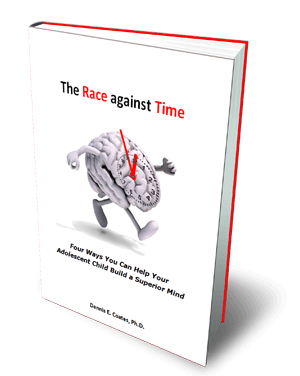[five_sixth] [/five_sixth][one_sixth_last][social_buttons hide_share_count=”true” facebook=”true” twitter=”true” pinterest=”true” linkedin=”true”][/one_sixth_last]
The Race against Time

More than a dozen books about “the teen brain” have been published since pioneering neuroscientist Dr. Jay Giedd discovered that child brain development continues throughout adolescence. The part of the teen brain under construction is the prefrontal cortex (PFC), a large area located directly behind the forehead that handles impulse control, judgment, concept formation, evaluation, reasoning, intuition, problem solving, decision making, planning and organization—what brain scientists call “executive” functions. Taken together, these capabilities comprise a fair definition of what we call “critical thinking” and “intellect.”
My expertise is in adult learning and development; I’ve been studying the human brain and how it learns for thirty years. This passionate interest in the brain has led me to discover the consequences of this final stage of brain development. During adolescence, the brain is wiring the foundation for critical thinking, which will serve the individual throughout the rest of adult life. Some young people will construct a robust, expansive foundation; others may end up with minimal intellectual capacity or somewhere between the two extremes. The ultimate result depends on whether a child exercises critical thinking regularly during adolescence. Adolescence is literally a once-in-a-lifetime opportunity to construct this foundation, and the future success and happiness of the child hangs in the balance. The good news is that parents can affect the outcome, if they know what to do.
To help parents and other concerned adults take luck out of the equation, I wrote The Race Against Time and made it available free on this website. Many people get involved in the raising of a teenager—parents, relatives, teachers, counselors, ministers, coaches, or other mentors. If they want the young people they’re working with to grow up to be successful, happy and independent adults, mentors need to understand what’s really going on in the adolescent brain.
